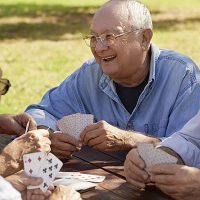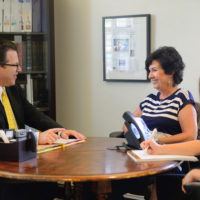Ask Your Elder Law Lawyer These 10 Questions

When meeting an Elder Law Lawyer for the first time it is hard to know what you need to know. We assembled the most important questions here.
1. Can my loved one sign legal documents even with dementia?
Can my loved one sign legal documents even with dementia? It depends. (How’s that for a lawyer’s answer?!). It depends on how progressed is the dementia and if, at the time of signing, your loved one has the requisite capacity. Courts have found that even people in the most advanced stages of dementia can be competent to sign important legal documents. Understand that the medical definition of incapacity is different from the legal definition of incapacity. A person diagnosed with Alzheimer’s Disease or another dementia may still be legally competent to sign documents. It is possible that a doctor could already have written a statement of incapacity regarding the person but this is not determinative of legal incapacity. The capacity requirements for each legal document can be different. Your attorney should discuss capacity issues with you and will know the legal requirements.
2. What are the core planning documents I need?
It is important for most people to have these documents. For people where dementia is at issue, it is even more important. These are the documents you need:
- a client-specific durable power of attorney containing long-term care planning provisions (generic forms rarely suffice)
- health care directions (often referred to as Living Wills and Health Care Surrogate Designations)
- a Last Will and Testament
- a trust agreement.
3. What is the single greatest threat to my financial security?
The catastrophic cost of long term care is the greatest threat to the finances of people over the age of 50. People with dementia need more care for longer. Most people do not want to think about or plan for what happens when they need extended care. The fact is that most people will require long-term care and most will either not be able to afford it or will get wiped out by the cost. There are legal and ethical ways of protecting one’s life savings against the cost of care without giving away assets and without waiting out penalty periods. Ask your lawyer for a referral to an Elder Law specialist unless they are themselves so certified.
4. Are you (the lawyer) a certified specialist?
The Florida Bar certifies attorneys as specialists in certain practice areas such as Wills, Trusts and Estates or in Elder Law or in Criminal Law. Gone are the days of the general practitioner who can handle your Will, your traffic ticket, your divorce and your contracts. Seeing a specialist is safer and usually the same cost.
Attorneys who are certified as Specialists by The Florida Bar must pass a lengthy and difficult written examination, peer review of their practice and an audit of what types of cases and how many they have handled. Among lawyers, Board Certification is a big deal. It should be a big deal to you too. Elder Law Attorneys have specific experience in dementia-specific and health-related legal matters. It can make a very big difference in quality of life. Even if you have another type of attorney as your estate planning lawyer or family lawyer, you can still visit with an Elder Law Attorney and keep your regular attorney.
5. Are there dementia-specific provisions for Powers of Attorney?
Elder Law Attorneys include many provisions for dementia-specific and long-term care issues not found in typical powers of attorney. For example, one big issue of late is hospitals and nursing homes chasing adult children for their parents’ unpaid bills. The facilities seek the patient’s signature on the admissions agreements but they also want the children’s signatures.
The power of attorney should contain a specific provision authorizing the children to sign these admission agreements on your behalf. That way, when they sign, they are signing in a representative capacity and they are not individually liable.
Another example are the provisions included by Elder Law Attorneys for Medicaid and V.A. benefit planning. With changes in the laws, it is more important than ever for your agents to have the authority they will need to protect your assets even if you yourself cannot sign. Does the power of attorney specifically waive self-dealing prohibitions? Does the document authorize transfers of assets even to the agent(s)?
A power of attorney is not a form document but instead provides a good lawyer with an opportunity to draft to his or client’s anticipated needs.
6. Do my documents “ladder” successors or do they make use of co-agents?
One of the greatest areas where powers of attorney, trusts and health care documents break down is when one agent is not able to act and the next person on the list tries to do so.
Many documents “ladder” successors by saying if #1 cannot act, then #2 shall act and so on. This might make sense in the theoretical world of drafting a document but in real life, this can create BIG problems. People with dementia and their loved ones are much more likely than others to need to use the documents imminently. In real life, when #2 shows up at the bank to pay bills or at the hospital to make decisions, the bank or hospital is going to say “Where is #1?”. Until #1 is proven to be incompetent or deceased, #2 has no authority to act. Meanwhile, nothing is getting done and often decisions, especially health-related, must be made quickly.
There are good ways of using co-agents that are safe, more effective and more likely to lead to the enforcement of your wishes. This would be through the use of Co-Trustees, Co-Powers of Attorney and Co-Surrogates using language that avoids pitfalls. Co-agents are not for everyone. Discuss with your attorney.
7. What is a “Lady Bird deed” and should I have one?
A Lady Bird deed is a special kind of residential real estate deed which allows your property to pass to your children or other heirs immediately upon your death without normal costs, probate and court proceedings. The Lady Bird deed allows you to (1) own your home for the rest of your life; (2) retain your full homestead tax exemption; (3) retain your full homestead creditor protection; (4) where applicable, retain eligibility for Medicaid and other need-based programs; and (5) name beneficiaries of the home very similar to beneficiaries of an insurance policy. Most of my clients benefit from having a Lady Bird deed. My father is the attorney who gave the “Lady Bird deed” its name and explained the deed to other lawyers early in the field of Elder Law.
8. How much do you charge?
It is absolutely appropriate (I would say necessary) to ask a lawyer how he or she charges before you retain the attorney. Every lawyer charges differently. Some lawyers charge hourly, others charge a flat fee which is a set amount for a specified task. Some lawyers charge consultation fees; others charge none.
It is typical for personal injury or trial lawyers to do free consultations. Most successful transactional attorneys (estate planning attorneys, elder law attorneys, etc.) charge a consultation fee. In fact, this may be one way to judge the demand and therefore the reputation of a particular lawyer. If the lawyer is “giving away” his or her time or is charging less than the norm, that may be because they have to do so. Successful lawyers are busy and sometimes more expensive but the difference in fee can often be well worth it even on cases that the client think to be “simple.”
Do not expect a lawyer to quote you a fee or even an estimate before an initial meeting. You may think you know what needs to be done, and you may be right, but the lawyer must put you through an intake process to be sure of the “prescription” to quote an appropriate fee.
Ask exactly how your fee will be calculated. It is usual for there to be a signed agreement which puts everything into writing about the fee and the scope of the job.
9. What should I do with my original legal documents?
Your original legal documents should be kept in a safe, fire-resistant, water-resistant place. Be sure this place is known to and accessible by your children or other trusted agent(s). Copies are usually just as good as originals but some third-parties still ask for originals. Some lawyers provide safe-keeping of certain original legal documents in special vaults or cabinets. If you retain your own originals, buy a fire-resistant box and tell your loved ones how they can access it.
10. How can I carry my health care documents with me?
You may have the best documents ever but if they aren’t available when you need them, it may do you no good. Your important documents must be kept handy. We’ve created a “Digital Pocket Vault,” to help with this. The “Digital Pocket Vault” is a computer flash drive, the size of a credit card, designed to be carried in your wallet. If a paramedic responds to an emergency and you cannot speak, the paramedic will look in your wallet for your I.D., they will also find this “vault”. The vault can be plugged into any computer, including the one in the ambulance or hospital. Ask your lawyer how you can keep these critical health care documents portable.












